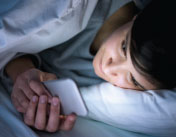A restful night’s sleep is elusive to some, taking a toll on energy, mood and normal functioning the morning after. Behnaz Sanjana pulls back the bedcovers on insomnia and how to deal with it.
You finally call it a day, put the lights out and settle into bed. But your mind is abuzz with a mental to-do list and that impending 8am meeting looms large in the subconscious. You count the hours till the alarm will shriek – trying to silence the mind – but all you do is toss and turn. Midnight comes and goes. You pass time on your social media pages. It’s 2am. You head to the kitchen for cookies, returning to bed and wishing for some sweet sleep, and count the hours to 6am again. Now the clock reads 4.30am. And then your foggy brain can’t remember when you fall into fitful slumber.
Most of us have experienced this scenario more than a few times and know how frustrating it can be. But when this happens night after night, for weeks together, it’s called insomnia and it can feel deadly. Dr Bassam Doujaiji, American Board consultant in pulmonary, critical care and sleep medicine at Bahrain Specialist Hospital tells us more.
What Is It?
“Insomnia is a common disorder that can make it hard to get to and stay asleep, or cause you to wake up too early and not be able to get back to sleep. There are two types of insomnia: primary and secondary. The former is when the sufferer has sleep problems that are not directly associated with any other health issue. The latter is secondary to another medical condition,” says Dr Bassam.

Insomnia is different from sleep apnoea which occurs when a sleeping person’s breathing is interrupted multiple times through the night, causing disturbed sleep. The repercussions however, are similar.
Similarly, insomnia can also be categorised into acute and chronic. Acute is short-term and normally resolves itself and, according to Dr Bassam, is often due to life stressors such as loss or change of a job, death of a loved one, relocation, illness, jetlag and environmental factors such as noise, light or extreme temperatures that interfere with sleep.
“Chronic insomnia occurs when the person has sleep problems because of issues like anxiety, depression, arthritis, cancer, heartburn, pain, asthma or taking certain medications,” he continues. It persists for a minimum of three nights a week over an extended period of more than three months. Besides being triggered by unhealthy habits or thought patterns, it can also be hereditary and takes time and perseverance to overcome.
Insomnia is not just about struggling to sleep at night. It’s also struggling to get your act together in the morning. “Insomnia can disturb not only your energy level and mood but also your health, work performance and quality of life. Some of these concerns include not feeling well-rested after a night’s sleep, daytime fatigue or sleepiness, lack of motivation, poor performance at school or work, irritability, depression or anxiety and increased errors or accidents,” explains the doctor.
“If you continue to operate without enough sleep, you may see more long-term and serious health problems like high blood pressure, diabetes, heart attack, heart failure or stroke.”
Dr Bassam goes on to say that it’s important to understand what’s causing your sleep deprivation. Because sleep disorders can have complex causes and serious health consequences if left unmanaged, it’s very important to speak with a sleep medicine consultant to gain a thorough diagnosis and to discuss your best treatment options.
“The most reliable diagnosis for any sleep disorder is a sleep study also known as polysomnography [PSG]. Sleep is monitored closely to diagnose problems. The findings of the overnight study, along with a detailed medical history can be used to determine the type of disorder [insomnia, sleep apnoea or another] you suffer and the severity,” says Dr Bassam.
Diagnosis and Treatment
 He maintains that treatment for chronic insomnia includes, first, treating any underlying conditions or health problems that are causing the condition. “If insomnia continues, your health care provider may suggest behavioural therapy. This approach helps you to change behaviours that may worsen insomnia and to learn new ones to promote sleep. Behaviour therapy is commonly used to treat psycho-physiological insomnia. Although these techniques require some effort and take time to work, they do provide a means of coping with insomnia that help people return to more normal sleep patterns. You don’t have to put up with sleepless nights. Simple changes in your daily habits can often help,” he concludes.
He maintains that treatment for chronic insomnia includes, first, treating any underlying conditions or health problems that are causing the condition. “If insomnia continues, your health care provider may suggest behavioural therapy. This approach helps you to change behaviours that may worsen insomnia and to learn new ones to promote sleep. Behaviour therapy is commonly used to treat psycho-physiological insomnia. Although these techniques require some effort and take time to work, they do provide a means of coping with insomnia that help people return to more normal sleep patterns. You don’t have to put up with sleepless nights. Simple changes in your daily habits can often help,” he concludes.
 White noise or sleep music are known to help some of the wide-eyed to doze off.
White noise or sleep music are known to help some of the wide-eyed to doze off.
Autonomous sensory meridian response (ASMR), a nascent concept, refers to audio or visuals that can make one feel calm and blissful. It is described as a euphoric tingling and relaxation felt while seeing or hearing mundane things like flipping pages of a book, brushing one’s hair or comforting whispers, thereby helping to overcome insomnia.
According to the University of Maryland Medical Centre’s website, the essential oil drawn from fresh lavender flowers is medicinal. Scientific evidence shows that aromatherapy with lavender may slow the activity of the nervous system, improve sleep quality, promote relaxation and lift mood in people suffering from sleep disorders.
What You Say
Diana, Saar
 Circumstances led me to stay up late into the nights watching television. Eventually my body clock adapted to my new sleep patterns and now I find it impossible to sleep and wake up at normal hours, which can be problematic at times. I hope to get used to a healthy sleep pattern soon.
Circumstances led me to stay up late into the nights watching television. Eventually my body clock adapted to my new sleep patterns and now I find it impossible to sleep and wake up at normal hours, which can be problematic at times. I hope to get used to a healthy sleep pattern soon.
Perin, Sehla
My father had insomnia too. But changing my lifestyle completely worked wonders. Sticking to a regular pattern of sleeping early and waking up early really helped. And no afternoon naps.
When reading or a cup of cocoa doesn’t help me sleep, I practise focused breathing while lying down; it will put anyone to sleep! I also use guided meditation to relax and keep my ever-friendly crystals close by to lull me to sleep.
———————————————————————————————————————————–
We asked the WTM social media family for insomnia cures. There were lots of answers but we particularly liked this one from Bhavna Malkani: “I ask my mum to pat my head.”





































